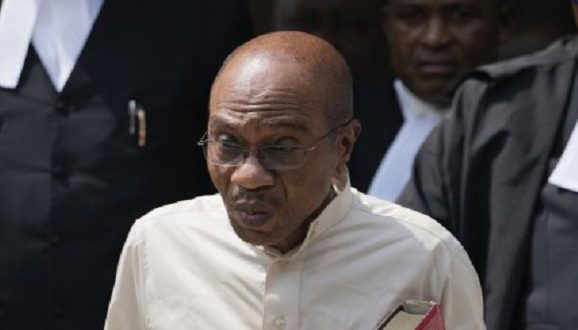Trial of former Governor of Central Bank of Nigeria (CBN), Godwin Ifeanyi Emefiele, began at the Federal Capital Territory (FCT) High Court in Abuja, yesterday, with three witnesses to testify against him.
He is being tried by the Economic and Financial Crimes Commission (EFCC) on six counts bordering on alleged breach of procurement procedure in the award of contract to April1616 Investment Limited.
At the opening of trial, the first prosecution witness exonerated Emefiele in the alleged N1.2 billion-vehicle supply contract. The witness, Shamsudeen Abulili, a top official of the Corporate Affairs Commission (CAC), gave evidence on how the company was incorporated on August 1, 2016, and tendered several documents about its existence.
He read out names of shareholders to include Aminu Idris Yaro, Maryam Aliyu Abdullahi and Saadatu Ramalan Yaro. Led in evidence by EFCC lawyer, Rotimi Oyedepo (SAN), Abulili, while tendering documents to show the firm’s incorporation on August 1, 2016, insisted that Emefiele’s name was not in any way connected with the company.
The witness explained that although the CAC was responsible for incorporation of the company, it, however, has no role in the day-to-day running of the entity.
Second witness, Remigious Ugwu, a Compliance Officer with Zenith Bank, narrated how the apex bank paid sums of money running in millions of naira into April1616 Investment Limited.
Specifically, he told Justice Hamza Muazu that on October 19, 2020, N39, 060, 465 was remitted, another N421, 953, 488 dispatched on November 6, 2020 and third of N304, 883, 720 paid on November 23, 2020 to same company by CBN.
Similarly, he said N304, 883, 720 was released on January 1, 2021 and another N304, 883, 720 paid by the same company on March 23, 2021 by the apex bank. He, however, admitted that none of the payments had any link to Emefiele’s name.
The third witness, Oluwole Owoeye, a Deputy Director, Banking Services with CBN and former Secretary to Major Contract Tendering Committee (MCTC) of the financial institution, said his body was responsible for ensuring compliance with extant procurement laws.
(The Guardian)



